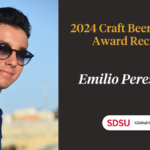 Kim Walker was already a regulatory affairs professional when she began pursuing her Master of Science degree in regulatory affairs at SDSU’s College of Sciences. Offered in partnership with the College of Extended Studies, the program provides critical ongoing training and education to those involved with the development, testing, manufacturing, and commercial distribution of pharmaceutical, biologic, veterinary, and medical device products.
Kim Walker was already a regulatory affairs professional when she began pursuing her Master of Science degree in regulatory affairs at SDSU’s College of Sciences. Offered in partnership with the College of Extended Studies, the program provides critical ongoing training and education to those involved with the development, testing, manufacturing, and commercial distribution of pharmaceutical, biologic, veterinary, and medical device products.
“I am truly grateful to SDSU for helping me grow as a regulatory affairs professional,” said Walker. “The program helped me understand the global regulatory ‘big picture’ and gave me hands-on practical skills I could use in my day-to-day work life. It also provided me the education and confidence in my regulatory knowledge to seek career growth opportunities that I might not have had the courage to pursue otherwise.”
Indeed. One month after earning her master’s degree, Walker launched Kim Walker Consulting.
What’s the full scope of services offered by Kim Walker Consulting?
I provide total product-lifecycle global regulatory consulting for my clients, which means I cover clinical, quality systems, and pre- and post-market regulatory affairs for any country in the world. Most of my clients are medical device and IVD (in vitro diagnostic product) manufacturers, but I also cover dietary supplements, food, combination products, biologics, and drugs.
How did you find out about SDSU’s Master of Science in Regulatory Affairs program?
It was through word of mouth. I was taking a course in another university’s certificate program and someone mentioned SDSU’s master’s program. I was contemplating enrolling in another university’s master’s program but theirs was only in-person classes and three times more expensive. I was going to have to pay out of pocket and I had a full-time job that was not very flexible or willing to let me take time off to go to school. When I learned about the SDSU program, I was thrilled to have a more work-flexible and less expensive option. If the program had not been offered online, I would not have been able to participate. In fact, there were four classes that were taught on campus at the time I was in the program. I was able to negotiate to take three of them through another online university. I was also truly impressed with how comprehensive the SDSU program was compared to the other program.
How long did the program take?
I started out taking only one course at a time because my work situation was very hectic. I was working for a start-up medical device company at the time and the economy was not good for venture investments. Therefore, that company was slowly going bankrupt and I was doing what I could to help the company save money, find money, and help my employees find other jobs before we had to lay them off. So, I was pretty busy but I also knew I needed to move forward with my own career and I saw SDSU as an opportunity to solidify my regulatory affairs career path.
It took me about a year to complete the four courses [for the Advanced Certificate]. That’s when I decided to fully commit to enrolling in the master’s program [10 additional courses]. I believe I enrolled in the program in the summer of 2003 and I finished all of my courses by the summer of 2005. I finished my thesis in the fall of 2005 but my official graduation date was January 2006. Practically speaking, it took me 3.25 years to complete all the courses and thesis, but on paper it took 3.5 years. If I had committed to the program from the beginning, I could have graduated in two years.
What do you think are the program’s key strengths?
The comprehensive regulatory education you receive at SDSU is one of its strengths and one of the reasons I chose this program. I remember having classes that covered the whole lifecycle of medical products and food. Although food was not a major topic, I did get some exposure to it and dietary supplements in a couple of my classes. I’ve always appreciated the well-rounded education I received from SDSU. It really helped me grow as a regulatory professional and helped me gain a broader view of the regulations as a whole.
Another key strength is the quality of the instructors. Most of them were fabulous and really made me work for my grades. I became a better regulatory writer as a result of their brutal criticisms of my papers, and I mean that in the best way possible. They really helped me improve my communication skills, which in my opinion is the most critical aspect of success as a regulatory affairs professional.
I remember a Project Management class taught by two men who were project management gurus. They were not regulatory professionals but had worked in the medical product project management field for years. They were a great teaching pair and made this topic fun to learn. Prior to this course, I had always shied away from dealing with project management and, in particular, Microsoft’s Project software. But after taking that class, I was running project teams and using the Project software without any hesitation. I was actually teaching other people in my company how to use Project as a tool. I am so grateful to those two instructors for making me unafraid to delve into a topic I had originally felt insecure about and felt wasn’t within my regulatory responsibilities. Now, I can’t imagine running a regulatory project without using those tools.
Another example is the clinical trials course. It was absolutely one of the best learning experiences. It was taught in person but the two instructors were so passionate about the topic that it was so much fun to go to that class. I had been working on clinical trial projects for a few years at that time but these instructors really helped me gain a whole new perspective on the subject. They gave me the history and meaning behind many of the regulations and why things were the way they were. That really helped me understand how to think like a regulatory professional and how to work within the boundaries of the regulations. Rather than just memorize the regulations, I actually understood why they existed and what they actually meant.
Can you give an example of a hands-on practical skill you gained in the program that you could use on the job?
In my pre-market submission class [Investigational and Marketing Applications for Drugs, Biologics, and Medical Devices], I actually wrote various parts of pre-market submissions and communications to the FDA. Obviously, most of it was contrived as part of a project for the class. Nevertheless, that’s invaluable experience most people don’t get even while working in the industry. I also learned how to create and manage projects using Microsoft Project through the Project Management course. I wrote SOPs [Standard Operating Procedures] in my Current Good Manufacturing Practice class. I wrote adverse event reports and CAPAs [Corrective and Preventative Action] in some of my other courses. That was the advantage of SDSU — hands-on practical experience.
What course will you begin teaching for the SDSU/CES RA program in the March 2015 session, and how did that come about?
I’m teaching the Medical Device Regulations course – RA 773. One of my previous instructors who I had gotten to know better through some professional volunteer opportunities, gave my name as a potential new instructor for the course. SDSU contacted me and the rest is history.
Anything you’d like to add that I didn’t ask?
I truly enjoyed the learning experience at SDSU. It was not easy, some classes were really tough, but I learned a lot and it fueled my passion for regulatory affairs. Now I want to give back to the community that helped shape me as a regulatory affairs professional and I want to help build a new generation of regulatory affairs professionals.




